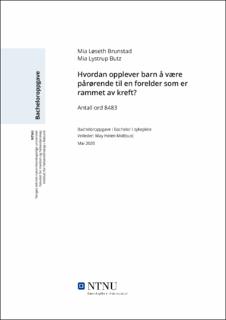| dc.contributor.advisor | Midtbust, May Helen | |
| dc.contributor.author | Brunstad, Mia Johanne Løseth | |
| dc.contributor.author | Butz, Mia Lystrup | |
| dc.date.accessioned | 2020-07-07T16:07:27Z | |
| dc.date.available | 2020-07-07T16:07:27Z | |
| dc.date.issued | 2020 | |
| dc.identifier.uri | https://hdl.handle.net/11250/2661205 | |
| dc.description.abstract | Hensikt: Hensikten med denne systematiske litteraturstudien var å belyse barn og ungdoms opplevelse av å være pårørende til en forelder som er rammet av kreft. Økt kunnskap om temaet kan bidra til at sykepleiere kan ivareta barn og unge i denne situasjonen på en bedre måte.
Metode: Dette er en systematisk litteraturstudie.
Resultat: Barn har et stort behov for god kommunikasjon og tilstrekkelig informasjon, både fra foreldre og helsepersonell, når de har en kreftsyk forelder. De anvender ulike mestringsstrategier for å håndtere situasjonen, deriblant distraksjon og isolasjon. Flere barn opplever et større ansvar på hjemmefronten og ønsker å gi emosjonell støtte til foreldrene, noe som innebærer at de unngår sine egne behov. Å ha en kreftsyk forelder kan gi ulike psykososiale reaksjoner hos barna. De kan utvikle psykiske problemer og flere er preget av stress og bekymring i hverdagen.
Konklusjon: Litteraturstudien viser at barn og unge har forskjellige erfaringer rundt det å være pårørende til kreftsyke foreldre. De har et stort behov for informasjon og kommunikasjon, som må være tilpasset deres alder og modenhet samt tidligere erfaringer. Ved riktig hjelp til å mestre situasjonen kan emosjonelle og psykososiale utfordringer unngås. | |
| dc.description.abstract | Aim: The purpose of this study was to explore and analyze children and adolescents’ experiences around having a parent with cancer. Increased knowledge of the topic can contribute for nurses to better care for children and young people in this situation.
Method: This is a systematic literature study.
Results: Children have a great need of good communication and adequate information from both their parents and healthcare workers when having a parent with cancer. They use different coping strategies to handle the situation, among them distraction and isolation. Multiple children face a greater responsibility at home, and desires to give their parents emotional support, that will often involve avoiding their own needs. Having a parent with cancer can lead to different psychosocial reactions among the children. They can develop mental problems, and several children are experiencing being stressed and worried about the situation.
Conclusion: This literature study shows that children and adolescents have different experiences around being a next of kin to parents with cancer. They have a great need of information and communication, that must be adjusted according to their age and maturity, as well as past experiences. With the right help to cope with the situation, emotional and psychosocial challenges can be avoided. | |
| dc.publisher | NTNU | |
| dc.title | Hvordan opplever barn å være pårørende til en forelder som er rammet av kreft? | |
| dc.type | Bachelor thesis | |
